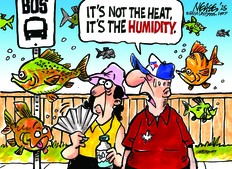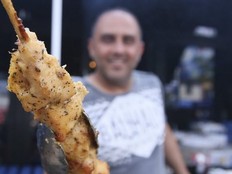CHARLEBOIS: Enough with the maple-washing
When grocers use the maple leaf to sell imported food, it’s not patriotism — it’s deception

Article content
In recent months, Canadian grocery stores have often felt like a year-round Canada Day celebration. Maple leaves were everywhere — on packaging, displays, and promotional signage.
But beneath this patriotic imagery, a deeper and more important question emerged: Where is our food really coming from?
This growing consumer curiosity has sparked a remarkable rise in public awareness around food origin labelling. Canadians are becoming more familiar with the legal distinctions between “Product of Canada,” “Made in Canada,” and “Prepared in Canada.” According to the Food and Drugs Act, all food labels in this country must be truthful and not misleading or likely to create a false impression. The rules are clear.
“Product of Canada” requires that at least 98% of the ingredients and processing be Canadian. “Made in Canada” means the last substantial transformation took place here, and “Prepared in Canada” refers to food that was processed, packaged or handled domestically — regardless of where the ingredients originated. This clarity has helped consumers make more informed choices, which is a step in the right direction.
This heightened vigilance has also coincided with a wave of consumer nationalism, fuelled in part by geopolitical tensions and anti-American sentiment. Despite the dominance of U.S.-owned retailers like Walmart, Costco and Amazon in our marketplace, many Canadian consumers made a conscious effort to avoid American food products. The impact was real. According to the latest data from NielsenIQ, the volume of American food products sold in Canada fell by 8.5% over just a few months. In the retail food sector, that kind of shift is massive and rarely seen outside of crisis events.
The speed and scale of this transformation left many grocers scrambling. Procurement strategies that once relied heavily on U.S. supply chains were suddenly under pressure, and origin labelling at store level became noticeably inconsistent. At first, some of the missteps — such as maple leaf symbols displayed next to imported goods — were attributed to logistical oversight. Given the time lag between promotional planning and in-store execution, some leeway was understandable.
But six months on, excuses no longer hold. The persistence of misleading displays and inaccurate origin claims has crossed the line from error into misrepresentation. Instances such as almonds or oranges being labelled as Canadian products — and price adjustments happening swiftly after customer complaints — raise serious concerns. This is textbook “maple-washing”: The act of invoking national symbols or language to imply domestic origin, even when the product clearly isn’t Canadian.
And Canadians are increasingly calling it out. The Canadian Food Inspection Agency (CFIA) received 97 complaints related to product origin claims between November 2024 and mid-July 2025. It conducted 91 investigations and confirmed 29 violations. That is an unusually high level of regulatory activity in such a short span, and it signals a growing lack of tolerance for deceptive marketing in the grocery sector.
Retailers must recognize that this isn’t business as usual. Canadians have shown tremendous solidarity in supporting homegrown products during a time of economic strain and heightened food insecurity. The least the industry can do in return is uphold rigorous standards in product labelling and merchandising. This is not about nationalism — it’s about trust. In a market increasingly driven by transparency and authenticity, misleading your customers is not just unethical; it’s bad economics.
Consumers who encounter questionable food origin claims should report them directly to the CFIA or to the retailer’s customer service. The CFIA typically investigates documented complaints within 30 days. But the onus should not be on shoppers to police the aisles. It’s time for grocers to meet the moment with the same accountability they now expect from suppliers, regulators and consumers alike.
After months of consumer-led vigilance, the burden now falls squarely on retailers to stop maple-washing once and for all.
— Dr. Sylvain Charlebois is the Director of the Agri-Food Analytics Lab at Dalhousie University and co-host of The Food Professor Podcast. He is currently a visiting scholar at McGill University in Montreal.














Postmedia is committed to maintaining a lively but civil forum for discussion. Please keep comments relevant and respectful. Comments may take up to an hour to appear on the site. You will receive an email if there is a reply to your comment, an update to a thread you follow or if a user you follow comments. Visit our Community Guidelines for more information.